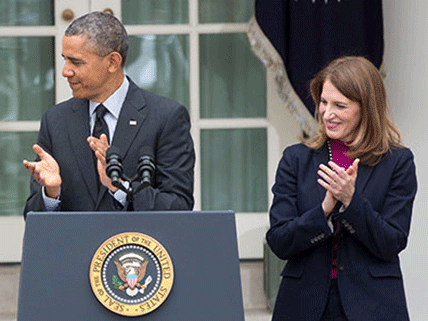The Post-Supreme Court Obamacare Standoff Has Already Begun

The Supreme Court has yet to release its decision in King v. Burwell, which challenges the legality of the administration's decision to allow subsidies in Obamacare's federal exchanges, but the post-game political battle has already begun.
On Monday, President Obama criticized the court for even taking the case, and on Tuesday he followed up with a speech making a argument for the law and its place in American politics.
Yesterday, the debate continued in a Capitol Hill showdown between GOP legislators in the House and Health and Human Services Secretary Sylvia Mathews Burwell.
In his remarks on Monday, President Obama said that Congress could "fix" a Supreme Court ruling against the administration with a one-sentence fix allowing subsidies in the federal exchanges. Basically, he said that the if the Court rules that the administration has acted illegally, the GOP-controlled Congress should rewrite the law to bless the administration's illegal actions.
The major question that the assembled Republican represenatatives had for Burwell, then, was whether or not the administration would sign anything besides a one-sentence fix extending the subsidies into the federal exchanges.
Burwell was not exactly forthcoming with a direct answer, instead saying repeatedly that the administration would be open to at least considering any tweak that improves "affordability, quality, and access." What exactly does that mean in practice? It's hard to say with certainty.
But as Reuters notes, Burwell seemed to indicate that the administration would not be interested in the sort of legislative response suggested by Sen. Ron Johnson, who has proposed extending the subsidies for those who already have them through 2017, while repealing the individual and employer mandates, as well as the law's coverage requirements. New enrollments in the exchanges would be allowed later this year, but new enrollees would not be eligible for subsidies. Basically, it would preserve subsidies temporarily for those who have them now while unraveling some of the law's other major components and setting the stage for some TBD health policy overhaul in the coming years.
Presuming that Republicans could agree on such a plan and pass it in both the House and the Senate, which is not at all certain, President Obama would likely then issue a veto, and then a protracted political tug-of-war would ensue, with Republicans arguing that they had voted to preserve the subsidies for those who have them, and Democrats arguing that, because Republicans refused to compromise by giving Democrats exactly what they want, Republicans were really to blame.
I don't think it's at all clear how an extended standoff like this, which could easily last through the next presidential election, would play out, but this week's jockeying on both sides makes it clear that the post-SCOTUS battle has already begun.


Show Comments (55)